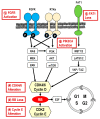CDK4/6 Inhibitor Treatments in Patients with Hormone Receptor Positive, Her2 Negative Advanced Breast Cancer: Potential Molecular Mechanisms, Clinical Implications and Future Perspectives
- PMID: 33477469
- PMCID: PMC7830463
- DOI: 10.3390/cancers13020332
CDK4/6 Inhibitor Treatments in Patients with Hormone Receptor Positive, Her2 Negative Advanced Breast Cancer: Potential Molecular Mechanisms, Clinical Implications and Future Perspectives
Abstract
Hormone receptor (HR)-positive, human epidermal growth factor receptor 2 (HER2)-negative breast cancer is the most common breast cancer subtype, and endocrine therapy (ET) remains its therapeutic backbone. Although anti-estrogen therapies are usually effective initially, approximately 50% of HR+ patients develop resistance to ET within their lifetime, ultimately leading to disease recurrence and limited clinical benefit. The recent addition of cyclin-dependent kinase 4 (CDK4) and CDK6 inhibitors (palbociclib, ribociclib, abemaciclib) to ET have remarkably improved the outcome of patients with HR+ advanced breast cancer (ABC) compared with anti-estrogens alone, by targeting the cell-cycle machinery and overcoming some aspects of endocrine resistance. However, which patients are the better candidates for these drugs, which are the main characteristics for a better selection of patients or if there are predictive biomarkers of response, is still unknown. In this review we reported the mechanism of action of CDK4/6 inhibitors as well as their potential mechanism of resistance, their implications in clinical practice and the forthcoming strategies to enhance their efficacy in improving survival and quality of life of patients affected with HR+, HER2-, ABC.
Keywords: CDK4/6 inhibitors; advanced breast cancer (ABC); breast cancer; endocrine resistance; endocrine therapy (ET).
Conflict of interest statement
All authors received a speaker honorarium from Novartis. The authors declare that sponsor had no role in the design, execution, interpretation, or writing of the article.
Figures




References
Publication types
LinkOut - more resources
Full Text Sources
Other Literature Sources
Research Materials
Miscellaneous

